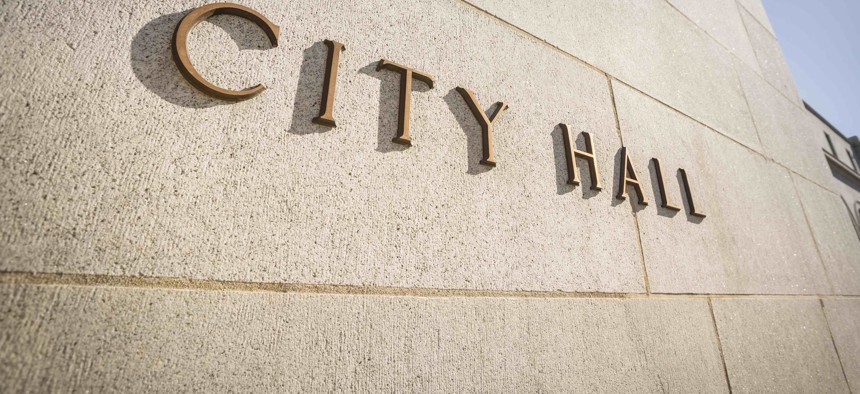Are Mayors Open to Federal Budget Cuts? It Depends Who You Ask

Pgiam via Getty Images

Connecting state and local government leaders
Route Fifty caught up with mayors from around the country to get their views on Republican threats to chop federal spending.
Mattie Parker may be one of the luckiest mayors in America when it comes to her connections these days on Capitol Hill.
Like other city leaders around the country, the Republican mayor of Fort Worth, Texas in an interview earlier this month described dealing with issues like affordable housing and violent crime. The city is also trying to use transit to revitalize a corridor that some have recently characterized as Fort Worth's “homeless district.”
Parker, though, can look to Washington and see a key ally in Congress.
With Republicans winning control of the House in last November's elections, the chairwoman of a committee that plays a key role in controlling the federal government’s purse strings, is now U.S. Rep. Kay Granger, a Texas Republican who is very familiar with the city.
Granger grew up in Fort Worth, still lives there, and was previously the city’s mayor.
“A lot of members of Congress obviously have connections to where they're from,” Parker, who once ran Granger’s congressional office in the city, said at a recent U.S. Conference of Mayors meeting. “But it's unique when you were the mayor.”
But while Parker said there may be “opportunities” to work with Granger’s staff, her views also illustrated how there are partisan divisions among the nation’s mayors when it comes to the debate between Democrats and Republicans in Washington over cutting federal spending.
Parker did not endorse threats from House Republicans to block an increase in the nation’s debt limit unless President Biden and the Senate’s Democratic majority agree to spending cuts. Still, she said, “there is an argument to be made that the way the U.S. government has been spending money is very reckless.”
“We’re not allowed to operate in that way in city government,” Parker added, going on to say that she would “personally be supportive of reductions in spending, especially if they still remain focused on building thriving communities.”
Parker’s take on federal spending stands in sharp contrast to how Democratic mayors like John Hamilton of Bloomington, Indiana see things. “Lowering federal spending right now? Terrible idea,” Hamilton said in an interview. “Outrageous.”
The discussion about the federal government’s finances comes as cities continue to grapple with effects from the pandemic, like struggling downtown office districts, as well as longer standing issues, like homelessness and providing mental health services.
“I don't think lowering spending is what I'd like to see,” Buffalo, New York Mayor Byron Brown said. Buffalo dealt with a particularly difficult and sometimes tragic year, including a mass shooting in May at a supermarket in a predominantly Black area of the city. Brown said the city’s response to the shooting cost almost $600,000.
Then the city was hit in November by a huge storm that dropped about 80 inches of snow in the area. “And then after the historic storm, we had a once-in-a-generation blizzard in December. That cost over $10 million to respond to,” the mayor said.
Tyrone Garner, the mayor of Kansas City, Kansas, was on a similar page as Brown when asked about potential federal spending cuts. “It does raise concerns,” he said.
He noted that his city has “some of the most economically distressed zip codes in the state.” Garner added that a key concern is that cuts would “adversely impact our working residents.”
But others like John Giles, the Republican mayor of Mesa, Arizona, agreed with Parker. Federal aid has helped to fund “some things that will have a legacy impact” on Mesa, he said, including converting a motel into shelter for the homeless.
Even so, Giles said he is supportive of scrutinizing whether all the federal spending Congress has approved really is necessary and whether it worsens inflation. “I’m a Republican. I think every government expenditure needs to be defended,” he said.
“We have just gone through a couple of years of extraordinary federal investment. I understand that we can't afford to do that forever. We're gonna have to figure out how to go back to the way things were before,” Giles added.
The possibility of cuts is causing some mayors, including Detroit’s Mike Duggan, to worry that a budget deal to avoid the nation defaulting on its debts later this year could incorporate clawbacks of Covid relief dollars that cities and states haven’t spent yet.
Republicans have not laid out specifically what they would like to cut. But the threat of reducing spending has drawn attention from Rep. Rosa DeLauro of Connecticut, the top Democrat on the House appropriations committee.
DeLauro last week asked federal agency directors to assess and report back to her by Feb. 3 on the potential effect of cutting spending from levels included in a December spending law.
Among the funding that could be rolled back, DeLauro suggested, is for programs in the bipartisan CHIPS and Science Act, which aims to increase domestic semiconductor manufacturing and create technology research and manufacturing hubs around the country.
While Parker said she supports reining in federal spending, she also said she understands that mayors are facing difficulties and added that there is help the federal government can provide local governments.

NEXT STORY: Critics Take Aim at State and Local ARPA Spending on Prisons and Jails






